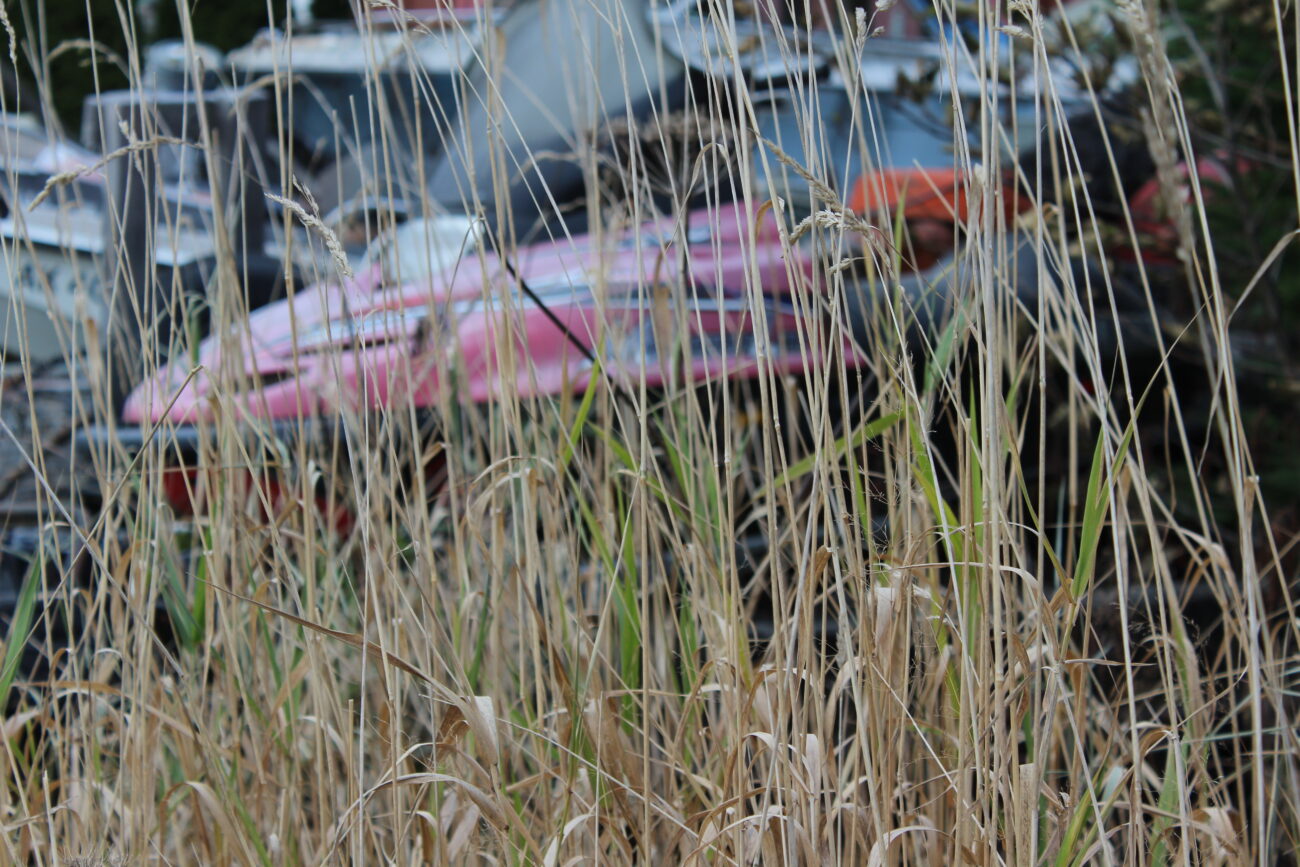
(Sage Smiley / KSTK)
Wrangell officials are starting to grapple with how to change local culture and code compliance, after years of lax policy enforcement.
Walk around the populated areas of Wrangell, and you’ll see a good number of derelict boats and vehicles, growing thick layers of moss. You might run into a dog, wandering the streets. Both occurrences are illegal, according to local code, but the statutes haven’t been consistently enforced for years.
Wrangell Mayor Patty Gilbert said at a work session in late July that she’s received some pushback after the borough re-assessed properties and saw values jump almost 50% this year.
“That’s one of the major complaints I’ve got on the new assessments was: ‘Mayor, you’re not cleaning up the property next to me,’” Gilbert said.
Wrangell Police say last year they hauled close to 70 junk cars from lots and roads around town, and there are many more. It’s a culture, they say, and one that wouldn’t be fixed by installing meters on a few streets in town.
At a work session in late summer (July 25), the borough assembly, staff and police department met to discuss how to begin to address a long-standing culture of non-compliance with local nuisance codes.
Assembly member Dave Powell said he thinks changing the tide and more aggressively enforcing penalties will be a “nightmare,” at least at the beginning.
“It’s gonna be a mess for a while, we know that,” he said during the work session. “Everybody knows that.”
Powell said he supports the idea of creating a code enforcement panel that would deal with noncompliant citizens.
“Petersburg and Sitka kind of go by: if there’s complaints and deal with it, and blah, blah, blah. Well, we’ve had so many complaints throughout the years, nothing’s ever been done, right? So I mean, to me, the complaints are irrelevant,” Powell said. “They’re already out there. People are sick and tired of complaining, because nothing gets done.”
When it comes to nuisance rubbish, Wrangell’s local code is clear. Property owners or lessees can’t indiscriminately store junk vehicles, debris, equipment parts or lumber on residential or industrial lots.
There are disposal options for vehicles in town – Juneau-based Channel Construction accepts junk vehicles (tires removed and drained of fluids) at the old mill site, or locals can pay $300 to dispose of cars at the waste transfer station. Borough officials discussed potentially waiving those dump fees during a first push to encourage compliance with nuisance rubbish laws.
People in violation of the ordinance can be fined $100 per offense, or up to $500. But those amounts haven’t changed since 1995, and will likely be raised by the assembly as part of a future crackdown on rubbish.
But the focus of borough officials isn’t the money, said Police Chief Tom Radke.
“We’re not here to have a revenue stream,” he said. “We’re just here to improve the town. It’s just a building block.”
There are also a variety of fines for dog violations that aren’t always enforced. Dogs are supposed to be licensed, vaccinated, not be too loud or rowdy, and be kept on a leash in public. Radke said compliance with those requirements is an ongoing problem.
“If we pick a dog up, we do require a license,” Radke said. “There’s a big difference between just opening the door and letting your dog out. And we do have people that call and say, ‘Hey, my dog got out.’ I mean, if you’re actively looking for it, it happens, I get it. But when it’s the same dog… We’ve got two dogs that come up just for treats. They come knocking at the front door. And I’m like, ‘Okay, come get your dog.’”
But even for the police department, tasked with enforcing the ordinances, it can be difficult on the ground.
“The one across the street, he comes over paws at the door [for a treat],” Radke said.
“Well see, I think you’re the problem,” Mayor Gilbert quipped.
Borough Economic Development Director Kate Thomas said it’ll be important to educate the public while working to enforce borough codes.
“It’s just about education initially,” Thomas said, “So you front-load it and people know what they’re getting into – correcting all the wrongs of yesteryear”
After discussion, Mayor Patty Gilbert suggested a two-pronged approach to shifting the borough’s expectations of code enforcement – establishing a code enforcement panel, which will likely involve a resolution of the borough assembly, and a public information campaign to inform the public about their responsibilities and rights when it comes to nuisance codes.
The six-member panel will likely include representatives from the police department, capital facilities, the planning and zoning committee, and potentially the fire department – any borough department that could be dealing with enforcing code requirements, as well as a member-at-large.
To start out, borough assembly members say they’ll focus on nuisance rubbish and dog compliance.
But a public information campaign could also lay groundwork to address other widely-held misunderstandings about homeowner responsibilities – like who’s in charge of shoveling sidewalks when it’s snowy out. Spoiler: that’s a homeowner’s responsibility.
Although Mayor Gilbert supports pursuing code enforcement, she said she’s also concerned about indiscriminate application, and the stalled development of new industrial lots.
“What appears to be junk to me might be somebody’s retirement project, their old car that they’re going to refurbish,” Gilbert said. “I regret that we don’t have additional space right now in our industrial park. That may help some people because they don’t have a place to move something that they really want to keep.”
There isn’t a timeline for when Wrangell might stand up a code enforcement panel, or crack down on rubbish or wandering dogs. Although the laws are in the books, enforcement is easier said than done.
Get in touch with KSTK at news@kstk.org or (907) 874-2345.











